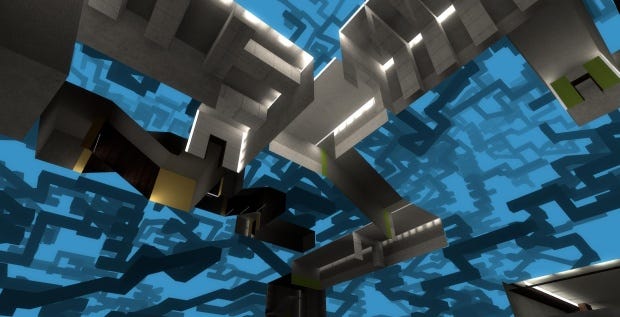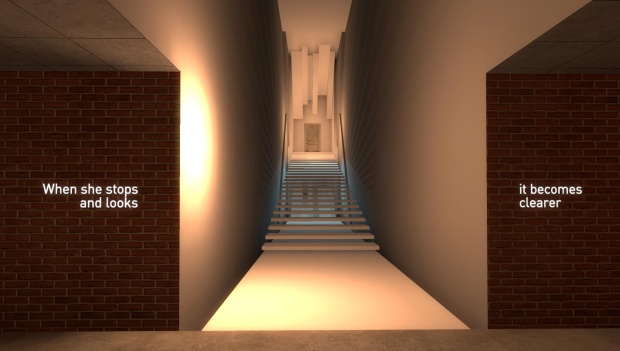Wot I Think: The Beginner's Guide
The Davey Parable
The Stanley Parable creator, Davey Wreden, is back two years later with a solo project, The Beginner's Guide [official site]. Released under his new development name, Everything Unlimited, this is an abstruse wander through a mysterious collection of games and game ideas, quite unlike anything else you've played. Does it work? Here's wot I think:
The inevitability of comparison with one’s previous games can often stifle a developer. Especially when your previous game was a cultural phenomenon in gaming. How do you follow The Stanley Parable? Well, co-creator Davey Wreden appears to have embraced this destiny in The Beginner’s Guide, almost as much as he’s ignored it.
Narrated by Wreden himself, we’re presented with what is apparently a collection of short, often unfinished games by a friend of the developer named Coda. It begins in an experimental Counter-Strike level, with Wreden explaining (as you’re free to wander around) that he hopes by creating this project and sharing this work it will encourage Coda to create new projects once again. Wreden explains a bit about what makes this simple level interesting to him (floating blocks, odd deliberately unfinished textures, and so on), before you’re whisked away and put into a crude, barely started first-person shooter.
And so it goes on, as you experience these short games, or short excerpts from games, Wreden narrating the experience, pointing out what interests him about the level, commenting on common themes, reflecting on his relationship with the author, and noticing when you wander off the main path and commenting on that, too.
So as strikingly different an idea as it may be, there’s an awful lot in common with Stanley, and so inevitably your head draws comparisons. First-person levels, a narrator, environments changing themselves around you, a level in which you can only walk backward with the scenery changing while you’re not looking, and a (rarely) reactive narration that occasionally notices when you’re not ‘playing along’.
And that caused a strange reaction in me – so many semiotic similarities changed my behaviour. I started wanting to disobey Wreden’s informal descriptions. Say, he tells me I can speed movement back up from an almost imperceptible crawl by pressing Enter, I find myself wanting to get to the destination at that slowed pace, to defy it, to see if I can provoke a response. But I’m not sure it’s that sort of game at all.
What developed as I played was a peculiar sense of disconnect from the experience, not because I wasn’t enjoying the fiction, but because the conceit of the fiction began to feel too big. Wreden is purporting to have this directory with all of his friend’s experimental games, and he’s stitching them together, explaining that he’s changing back-end things to allow you to jump ahead, or remove walls, or speed up, and casually giving you his interpretation of the meaning behind the esoteric and artistic projects. But, since these are obviously his own games, created for this game, his analysis and commentary is therefore all false, empty, deceitful. (And when he's boldly praising the cleverness of them, a little uncomfortable.) I rather liked that about it.
I deliberately wrote everything above at a midpoint of the game, which lasts maybe two hours. I kind of assumed that if I wanted to describe the game both honestly, and without spoiling it, I’d need to write my thoughts before it was over. I was right. If you finish it then read that bit, you’ll realise the mistakes I was making. I’m fairly paralysed to write usefully about it at this point now it’s over, knowing much more about what it is.
So, in a more detached way, I can say that this is clearly a very personal project from Wreden. Where Stanley was extremely detached, wry, sarcastic and even cruel, The Beginner’s Guide is much more about intimacy. About the deeply personal relationship a developer can have with his games. It’s about meta-analysis, Barthesian semiotics, the deaths of authors, and just trying to figure out why you like a thing. It’s about understanding, identity, fear. It’s about themes that would spoil it to mention. It’s a game that’s probably about an awful lot of stuff.
How well it works is, more than in most cases I suspect, going to be in the eye of the mouseholder. I think the game’s greatest weakness is that the celebrated game ideas within often aren't that great. A couple are, but I found myself desperately wishing this project could have been used to deliberately throw away some extraordinarily brilliant ideas. The walking backward level comes close, but then I think it mostly drifted toward an easier, more obfuscated place. The emphasis on being esoteric rather than clever, obtuse rather than surprising.
The overall narrative also doesn’t really hang together if you give it too much thought toward the end, but I’m also fairly convinced it doesn’t need to. Well, yeah, I can’t really say more there.
In fact, most frustrating of all for me just now, to accurately describe the atmosphere of the game is to most spoil it. I want to say, “It feels like X to play,” because that would best convey the experience to you in the most useful buyers’-guidey way. But it’s such that I can’t.
So did I enjoy it? Kind of. I think I appreciated it more than I enjoyed it, and then that appreciation was tinged with a wish that it could have been more. More clever, more surprising, more deep. But more importantly, it made me think, made me worry about people I care about, made me uncomfortable. And for that, I think, it deserves praise.







